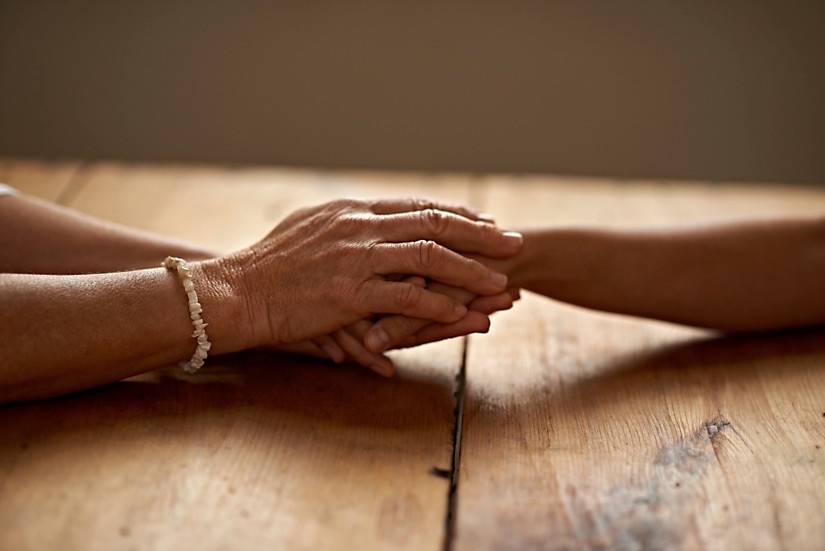Daddy died on December 4, and I haven't been home since.
I've been hiding out three hours from his house, hoping that I could gain the courage to eventually drive home. It's been four months. I don't stare blankly at the wall as much as I did in the beginning.
I can now focus on assignments as I write. But every once in awhile, when I think I'm doing alright, grief sneaks up and reminds me that I'm not where I think I am—that loss isn't OK, and neither am I.
What Is This Feeling? What Is Grief?
Even though I was there when he died, my dad's death isn't entirely real to me. I was with him for two weeks prior to his passing and helped care for him on weekends during the 10 months he battled cancer. But today, sitting in my cozy Nashville, Tenn., living room, the only pieces of evidence I have of his death are the legal documents I received in the mail and the nagging urge I have to call home.
Every now and then reality bounces through my head, and I'm stunned by the truth that my father died. It's not just that I haven't seen him in a while—it's that he's gone. When these moments come, I have to pick myself up and grieve again.
You may have never experienced the death of a parent, but that doesn't mean you've never felt this kind of grief. Grief isn't just related to death. Grief is an emotional and physical reaction to any traumatic or stressful loss: divorce of parents, loss of friendships, break ups, academic failures, injuries and illnesses, to name a few.
Regardless of the trauma, reactions to jarring circumstances are similar.
The 5 Stages of Grief
Psychiatrist and author Elisabeth Kübler-Ross defined five stages of grief in her groundbreaking book, On Death and Dying. But just like me, Kübler-Ross must have known that grief is tricky because these stages have no set order.
In fact, one may or may not experience all the stages, but everyone who grieves will most likely experience at least two. Here‘s a brief description of the five stages:
Denial: This is a conscious or unconscious refusal to accept the situation at hand. It's a defense mechanism and is perfectly natural.
Anger: People dealing with emotional upset can be angry with themselves and/or with others, especially those close to them.
Bargaining: When you face a loss you can't imagine bearing, you might become more willing to do anything to negotiate another way. But bargaining isn't just for matters of life and death. Right before a break up, somebody usually says, "Can we still be friends?"
Depression: When reality sets in, depression is soon to follow. Routine tasks become drudgery and emotions are exaggerated. Apathy, lethargy and sorrow are common feelings associated with depression.
Acceptance: This has everything to do with learning to deal with the situation at hand. It's most evidenced as individuals move forward and embrace life on it's new terms. Although the grief stages may occur in any order, acceptance usually marks the end of the grieving process.
When You Feel Alone in a Crowd
In The Little Prince, Antoine de Sainte Exupéry wrote, "It is such a secret place, the land of tears."
He nailed it—grief is personal and private.
After my father's death, I found myself in a room full of people I love, yet I was thinking, I've got to get out of here. I can't be here anymore. I don't want to be near these people. I need to be alone.
The people you love most in this world will want to help you grieve, but they might not know how. The best thing you can do is communicate what you need—this is appropriate and helpful. Don't hesitate to say something like, "I need you to be here with me, but I don't need advice or clichés. Just be here."
Such a statement might actually relieve some of the tension and awkwardness that often accompanies condolences.
The Physical Toll of Grief

When you're grieving, your emotions are jacked up—that's obvious and expected. But are you dizzy, fatigued or short of breath?
Grief is such a big deal that it impacts you behaviorally, physically and psychologically. When it comes to behavior, you may find that you care a bit less about hygiene and organization, but you may care much more about waiting in lines or finding a parking spot—it's common for irritability to be at an all-time high.
Physically, you may experience aches and pains, headaches, nausea or even hives. Psychologically, the expressions of grief may vary from feeling sad to feeling guilty. Your dreams might change, your concept of time might be loose and it's quite common for everything to seem surreal.
For a season, you may not be able to absorb much of anything. I felt as if I swallowed the sea. I had so many emotions to work through—lots of feelings clanging around in my heart and mind‚ and I couldn't put anything on top of it.
I had no emotional room to process. I couldn't watch movies or TV. I couldn't focus to read and I didn't have the energy to think. Instead, I stared at the wall. In fact, I felt good about staring at the wall.
What the Bible Says About Grief
Today, the world says hard things are to be passed over as quickly as possible and should be avoided at all cost. But the Bible encourages us otherwise. The promises are these: Grief brings wisdom (Ecclesiastes 7:4); God is near (Psalm 46:1; 147:3); and comfort can be found (Matthew 5:4; 2 Corinthians 1:3-4).
Here's what I know for sure: Grief will show you what you're made of, and it will show you what God's made of—stuff that doesn't change, leave or die. Grief has the potential to transform your life for the better. In her book Blessings, Mary Craig writes:
"The value of suffering does not lie in the pain of it, ... but in what the sufferer makes of it. ... It is in sorrow that we discover the things which really matter; in sorrow that we discover ourselves."1
Today, I'm beginning to see the gifts that grief has given me. I wear my heart on my sleeve, and I'm now more transparent. I've come to like myself more when I'm broken than when I'm put together—turns out I'm truer and kinder this way.
I've learned to live with contradictions. I'm both terribly sorry and grateful about the same experience. Awful has become awfully good. Living my faith in the midst of layers of grief and a season of heartbreak has been the most challenging experience of my life with God and I can say that grief is good and is a gift, continually driving me to God who brings peace and binds up my broken heart. That makes grief and all of his friends easier to live with.
How to Help a Friend Who's Grieving
Acknowledge the situation and express concern.
Offer practical help—run errands, buy groceries, do the laundry.
Practice the ministry of presence. Just be there. That's all you can do.
Understand that grieving is a long process. Just because your friend looks fine, doesn't mean he or she is fine.
